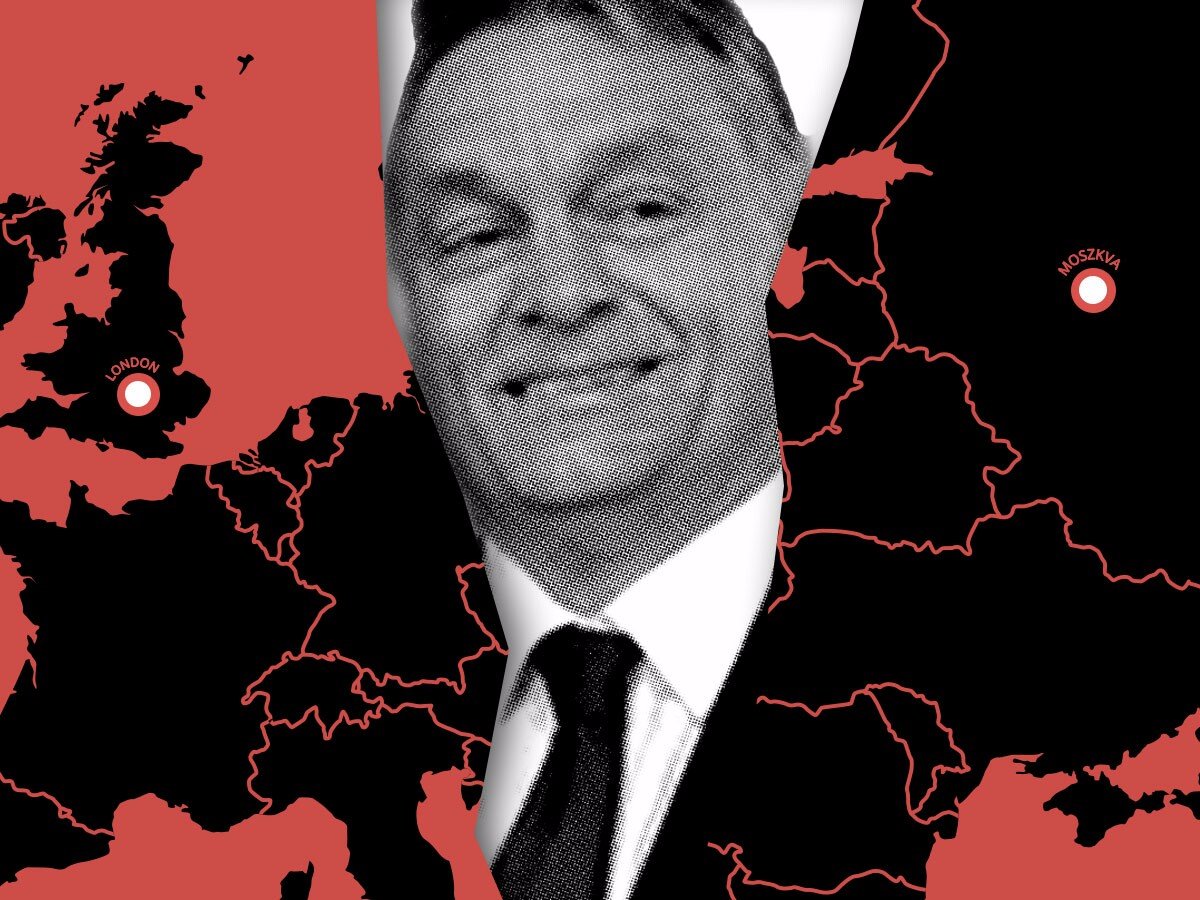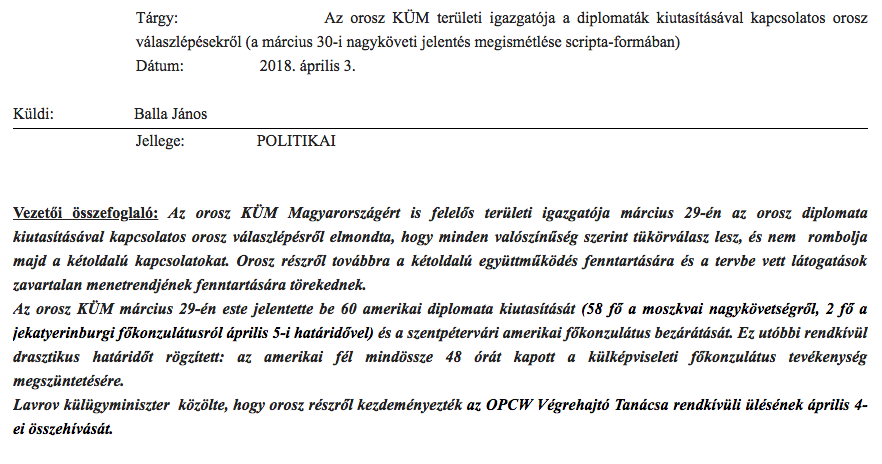Russia and Hungary seemed to clash over the Skripal poisoning. In the background, it was a different story

Since the government of Viktor Orbán has developed close ties with Vladimir Putin’s Russia in recent years, Hungary’s response to the Skripal case may have seemed surprisingly tough. This spring, Viktor Orbán’s government decided to expel a Russian diplomat in a show of solidarity with the United Kingdom after the poisoning of Sergei Skripal, a former Russian spy living in the UK.
Hungary’s response was striking because of its good relationship with Moscow. The leaders of the two countries meet at least once, sometimes twice a year, signing long-term gas contracts, supplying the city of Budapest with Russian metro cars and cutting a €12 billion deal on a new Rosatom-built nuclear power plant. (Read our inside story of how Hungary became close to Putin.)
The Hungarian government not only refrains from publicly criticizing Putin’s regime, but Hungarian propaganda outlets close to the government openly copy and disseminate pro-Kremlin narratives and quote stories by Russia Today or Sputnik. Moreover, Hungary has not officially expelled a single Russian diplomat under the rule of Viktor Orbán since 2010.
However, according to a Direkt36 investigation, the Hungarian expulsion after the Skripal case was carefully arranged in a way not to endanger this special relationship. Documents and interviews show that both countries made efforts not to cause real damage to one another while on the surface they formally fulfilled their duties in condemning each other’s moves.
According to a diplomatic cable written by Hungarian ambassador to Moscow János Balla on 3 April 2018 and obtained by Direkt36, the Russian foreign ministry assured the ambassador that no deterioration is expected in Hungarian-Russian relations because of Hungary’s expulsion of a Russian diplomat.
Several diplomatic sources told us that Hungary’s pick for expulsion was a Russian GRU agent (military intelligence officer) working under diplomatic cover at the Russian embassy in Budapest who was already about to finish his posting in no more than a few months.
Moscow, in return, chose to send home a not too senior Hungarian foreign trade attaché who was in fact trying to leave Moscow for a long time and get a new posting in a Western country. Eventually, the Russian countermeasure resulted exactly in that, fulfilling the Hungarian diplomat’s wish.
We can only do this work if we have supporters.
Become a supporting member now!
Russia’s ministry of foreign affairs and the Russian embassy in Budapest did not respond to our inquiry. The Hungarian Ministry of Foreign Affairs and Trade, instead of answering our questions, only sent a short comment „we already said everything that could be said about this topic.”
Feigning a conflict
On 26 March 2018, Hungary’s ministry of foreign affairs announced that Budapest would join the US, Canada, Ukraine and multiple EU member countries in expelling Russian diplomats to back the United Kingdom’s retaliation against Russia for the chemical weapons attack in Salisbury. By the end of March, twenty-nine countries plus NATO expelled 153 Russian diplomats in total. Russia took countermeasures immediately.
Hungary expelled one Russian diplomat, and as a result, suffered the expulsion of also one of its own diplomats from Moscow.
At a press conference on 28 March 2018, János Lázár, then the head of the Prime Minister’s Office in Hungary, refused to disclose the identity of the expelled Russian diplomat, citing national security matters. He also added that the expulsion was a result of a request coming from NATO allies. Additionally, without citing any sources, Hungary’s state news agency MTI claimed that the expulsion of this Russian diplomat also could have been connected to the case of Béla Kovács, a Hungarian far-right (former Jobbik) member of the European Parliament accused of spying for Moscow. The Hungarian foreign ministry’s press release at the time added that the expelled Russian diplomat was „also conducting intelligence activities”.
British foreign secretary Jeremy Hunt said in an interview in September that all 153 Russian diplomats expelled by the UK and their allies were intelligence officers. A high-ranking British government official told Direkt36 that the diplomat expelled by Hungary is affiliated with Russia’s military intelligence service, the Main Intelligence Directorate, known as the GRU. Since GRU agents were responsible for carrying out the chemical weapons attack in Salisbury, the UK and her allies wanted to retaliate primarily against the Russian military secret service.
Three well-connected diplomats from different NATO countries, however, also told us that the Hungarian government eventually decided on the expulsion of a Russian diplomat who was already finishing his posting and was preparing to leave Budapest soon. All of our sources agreed to provide information on this diplomatically sensitive matter on the condition of not disclosing their identity. In addition, two other diplomats representing EU countries and a Hungarian diplomat also said that they had heard that the expelled Russian diplomat’s term in Hungary was about to end soon.
Diplomatic circles treated the Hungarian government’s response to the Skripal case as a „soft expulsion,” an attempt not only to please the EU/NATO community, but also to avoid causing harm to Russia. A diplomatic cable obtained by us also hints that there was no real conflict between the two countries. The cable was written by János Balla, who served as Hungary’s ambassador to Moscow at that time. He sent a written report on April 3 to different senior officials and departments of the foreign ministry, and to officials of other ministries as well.
According to the document, Balla attended a dinner party hosted by the Austrian ambassador to Moscow on the evening of March 29. (Austria was among the few EU countries refusing to expel Russian diplomats.) At the dinner, Balla talked about the expulsion with Oleg Tyapkin, the regional director responsible for Hungary at Russia’s Ministry of Foreign Affairs. According to Balla, Tyapkin had not seen the report by the Russian embassy in Budapest on the expulsion of their diplomat at that time, so Balla filled him in on the details.
Tyapkin then reassured Balla that Russia is interested in maintaining the friendly relationship and will likely respond in a way they can avoid any kind of escalation. Tyapkin „said of the Russian response that it would in all probability be a mirrored response and would not hurt bilateral relations. Russia aims to maintain bilateral cooperation and the smooth schedule of planned visits,” the Hungarian ambassador reported to his superiors in Budapest on April 3.
The authenticity of the cable was confirmed to us by a Hungarian foreign ministry official who was among the original recipients and another Hungarian source who obtained the report second hand.

Hungarian ambassador to Moscow János Balla’s diplomatic report on the Skripal-case. Photo: Direkt36
However, a high-ranking official of Hungary’s foreign ministry stressed that it would be wrong to conclude that Hungary only feigned the expulsion. The official, who talked on the condition of anonymity, said that it was important for the Hungarian government to react to the Skripal case partly because UK’s governing conservatives are a close ally of Orbán. One foreign diplomat also added that Hungary „was not the worst” in handling the Skripal case, as eight other EU countries (Austria, Bulgaria, Cyprus, Luxembourg, Malta, Portugal, Slovakia and Slovenia) did not even bother to take measures against Russian diplomats. According to multiple British government sources, London was also aware of how Hungary carried out its own expulsion. To the UK it was sufficient that Hungary formally expelled a Russian diplomat after all, and they were also satisfied with the way Hungary communicated the expulsion.
A British government source also said that the UK shared intelligence on the Salisbury attack with her allies, the Hungarian government included, and showed them factual evidence so that they could understand the severity of the chemical weapons threat. The British government emphasized to its partners that expelling GRU officers is not primarily just a show of solidarity with the UK, but also a way to prevent the Russians from murdering people with nerve agents on the streets of other NATO and EU countries. According to this official, the string of expulsions did very serious damage to Russian intelligence, and the British themselves took the lead in it. „We even found and expelled deep cover agents. Not even their own Russian colleagues knew they were spies,” the British official added.
Hungary’s measure did not even come close to this, and it also became obvious in recent months that the mutual expulsions caused no difficulties in Hungarian-Russian relations. Viktor Orbán not only had an impromptu meeting with Vladimir Putin in July during the football World Cup in Russia, but the two also gathered for their regular yearly official meeting in September.
No serious harassment expected
The Hungarian ambassador’s diplomatic cable also shows that Russians were much more aggressive towards other nations in Europe that have expelled their diplomats.
For example, towards the Germans, who only expelled low-ranking Russians but lost some of their most important diplomats after a tough countermeasure by Moscow. Even their military attaché was sent home, a position that is typically filled by high-ranking army officers also responsible for military cooperation.
„I was informed by the German Ambassador in Moscow that four low-ranking Russian diplomats were dismissed from Berlin with a one-week deadline. (…) The Russian MFA has expelled four German diplomats, including the military attaché and the attaché in charge of police matters,” Balla wrote in his cable to Budapest. The Hungarian ambassador also noted that deputy foreign minister Alexander Gruschko (who previously served as ambassador to NATO ) talked about the Skripal case during an earlier meeting on March 27, where Gruschko „hit a very serious tone and talked for more than two hours. The Russian standpoint he expressed was reminiscent of the Cold War, including the arms race.”
This Cold War mentality is clearly not the way the Russian secret service is treating Hungarian diplomats sent to Russia, despite the fact that Hungary is also an EU and NATO member country. „Before we set off to Russia to start our diplomatic mission, we were briefed by Hungarian counter-intelligence officers on what to expect from their secret services. The Hungarian officers told us that no serious harassment or aggression is expected from Russian Secret Service, thanks to the current political relations between Hungary and Moscow,” a Hungarian diplomat who served in Russia said.
However, there were signs that Russian agents entered Hungarian diplomats’ apartments, that phones were wiretapped, and rooms were searched, according to the source who asked for anonymity because of the sensitivity of the issue. But this is business as usual in Russia, according to the diplomat. „They were only checking in thebackground, possibly looking for a hidden cryptographic equipment in my room, or for other signs that I might be a Hungarian spy,” the source said. „We could sense their presence, but it was not menacing at all,” the diplomat added.
This is very different from how aggressively the FSB, successor of the KGB in charge of counter-intelligence, is behaving towards American or British diplomats. It is a widely reported phenomena that includes more extreme examples of harassment like killed pets of diplomats’ or feces left in rooms after break-ins.
In Hungary’s case, even the mirrored response promised by Tyapkin turned out to be very light, despite the serious language of its official announcement. Ambassador Balla “was given a note of protest and informed that in response to Hungary’s unfriendly and unfounded expulsion of a Russian diplomat on the basis of Great Britain’s unsubstantiated accusations against Russia in connection with the “Skripals case,” Russia declares persona non grata an employee of the Hungarian Embassy”, Russia’s foreign ministry stated.
The counter-measure resulted in the expulsion of one of Hungary’s seven foreign economic attachés to Russia. This Hungarian diplomat’s identity was confirmed to Direkt36 by several official sources. This Hungarian attaché was described to us as knowledgeable and well-connected, but relatively unimportant. „If that is the person whom the Russians have expelled, well, that was a very soft response,” said a Hungarian diplomat who served in Russia and was a colleague of the expelled attaché. Since trade between Hungary and Russia is very limited due to EU sanctions against Russia and the Russian embargo on EU products, losing one foreign economic attaché out of the seven posted in five large Russian cities (Moscow, St. Petersburg, Rostov-on-Don, Yekaterinburg and Kazan) does not matter much.
Moreover, a Hungarian source who knew the banned Hungarian diplomat well told us that the Hungarian foreign economic attaché wanted to leave Moscow for a long time. (This was also evident in an earlier public comment on social media by the attaché.) The attaché fought for a relocation to a particular Western country due to family matters. After being expelled by the Russians, the Hungarian diplomat’s wish was suddenly fulfilled and was relocated by the Hungarian foreign ministry to that exact Western country. „Eventually, it seems the Russians even did a service with the expulsion,” the former colleague of the attaché told us with a smile.
Similarly, the Hungarian expulsion made little difference from a national security perspective.
„With so-called symmetrical or mirrored responses, the expulsion and the counter-measure is sometimes fake, basically just intended to deceive the outside world,” a former Hungarian counter-intelligence officer who spent a long time working for the Constitution Protection Office (AH) told us. It is a substantive part of mirrored responses that the initial measure and the reaction are in harmony and about the same weight, the source explained, noting that it tells a lot if the Russians reacted to Budapest’s measure by banning a lightweight Hungarian diplomat.
The former counter-intelligence officer, asking for anonymity, also added that „it really does matter if the Hungarian government expelled an active person or someone who was already leaving.” According to this source, an intelligence officer who is preparing to leave had already long arranged to pass over his or her assets to a successor (a new case officer). Usually, the three of them convene for a conspired meeting, so that the agent network can smoothly continue to operate. „If an expulsion happens after the intelligence officer had already passed over his or her assets, sending home a spy will cause no rift in the enemy’s intelligence gathering activity. That is nothing more than mere formality, moreover, it can be interpreted as sort of a friendly gesture,” the former counter-intelligence officer added.
This story is the part of the series supported by the first EU-financed fund for investigative journalism IJ4EU and jointly developed by Re:Baltica, Postimees, Direkt36, 15min.lt and Respekt.cz. Financing was given as a result of the open call, managed by International Press Institute. English, Russian and Latvian versions of this article are also available on Re:Baltica.

